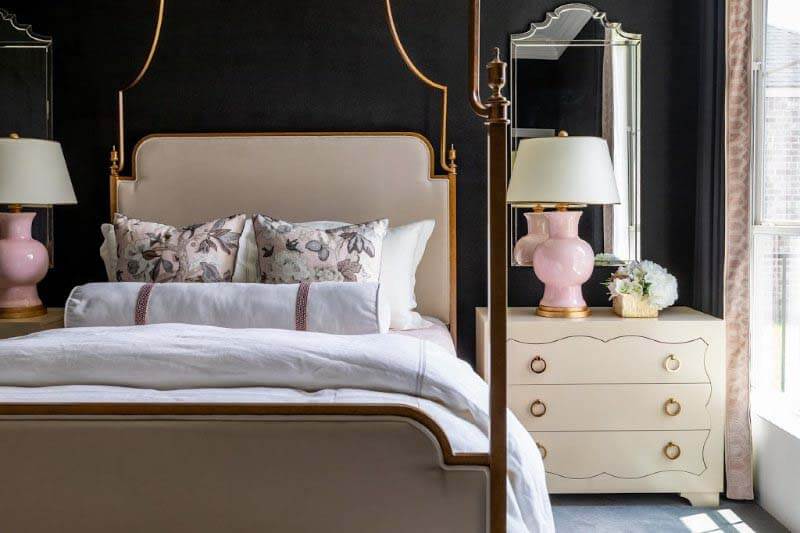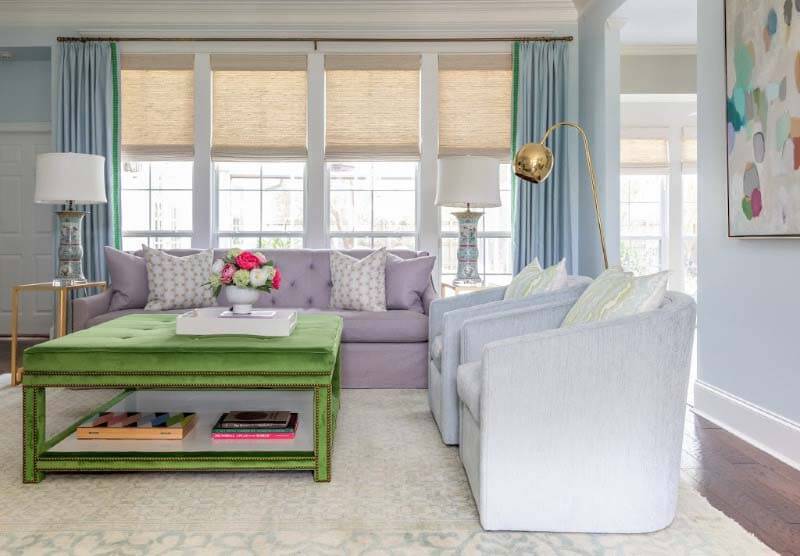Introverts used to get a bad rap. In a world that rewards bubbly personalities and chatty self-confidence, a quieter, more introspective approach to life hasn’t always been viewed as positive. Some of that changed in 2013, when the best-selling book Quiet: The Power of Introverts in a World That Can’t Stop Talking by Susan Cain came out, providing understanding and praise for introverts. Referred to as “the book that started the quiet revolution,” Quiet pointed out a third of the population falls into a category of people who prefer listening and working on their own to talking.
Now we have champions like Rachel Cannon, a Baton Rouge-based interior designer who has veered off into the world of podcasts and business coaching to delve into all things introvert-oriented. We asked Rachel to share what she’s learned over the years, how introverts can thrive in a talky world, and — since she is an interior designer, after all, and introverts love being home — how we can create spaces at home to nurture us quiet ones.

Have you always identified as being an introvert? When did you realize that was a “thing” and you fit the mold?
No, I didn’t understand the difference between introverts and extroverts until I was in my 30s. I took the Myers-Briggs personality test. It came back as INTJ (introversion as a base), which surprised me! I never thought of myself as shy — and that’s where the problem lies. Introversion and shyness are not the same things. Introversion is a temperament — something encoded in our DNA long before we are born. Shyness is a personality trait that develops as a result of our experiences in life. I was amazed to see introversion had more to do with needing time to rest, recharge and recover when we expend energy than it did with social skills.
What are the characteristics of an introvert? How do you know you’re truly an introvert versus just wanting to stay inside and watch Netflix sometimes?
Introverts are like batteries. When we expend energy, we have to recharge. That means social settings and loud experiences like concerts, big parties, and events drain us. But other, smaller activities drain us, too! I can be at lunch with five people and find it hard to see where I fit into the conversation if it requires me to talk over others to be heard. We also need solitude to achieve deep focus to perform at our highest. (My cell phone stays on silent!) Extroverts, however, are like wind-powered energy … the more energy they expend, the more they create.
RELATED: For a Stylish Kitchen: Don’t Forget the Accessories
Are there advantages to being an introvert?
The biggest advantage I find in embracing my introversion is I no longer waste time forcing meaningful connections with people. Introverts excel at deep, personal relationships, and I once spent a lot of time wondering why some people didn’t gel with me. It’s helped me become a better business owner because I know my limits when it comes to how much time I can spend with clients.
Would you say there’s a natural affinity between introverts and their home? How have you designed rooms — or even whole houses — that appeal to introverts?
I think introverts have needs when it comes to how our homes are designed. Open floor plans, game rooms and media rooms all reward extroversion … we design homes for every activity under the sun except quiet time. Our culture says families must be 100% together 100% of the time … and although I’m not a family therapist, I think there are some flaws in that belief system. I’ve never liked open floor plans. I’m a fan of a traditional Georgian floor plan with a formal foyer and walls that delineate how rooms are supposed to be used. Open floor plans cause so many distractions. There is one huge area where the entire family is supposed to congregate and watch TV, be on multiple devices, cook dinner, do homework, play, etc. — and the introverts are expected to be okay with it. Many of our clients have told us they “escape” from all this noise by going to their bathroom and hiding out there for 15 to 20 minutes.
“The Quiet Room concept” is a result of a conversation I had with a realtor who told me her mother always designated one room in their house as the quiet room — usually the formal living room so the kids wouldn’t go in there and break things. I took it a step further and thought, Oh my gosh, we should all be designing homes with a quiet room!


When did you decide to make a consulting business for introverts, and how does it work?
I’ve been thinking about offering business consulting services for a long time, but I didn’t know what set me apart. One day in early 2019, I made a list of all the things that were unique about me: 40 years old, divorced, entrepreneur, creative … And then, at the end of the list, I wrote “introvert” — and it was like the lightbulb literally came on. I’ve always worked with business coaches, but it dawned on me that everyone I’d worked with was an extrovert. No introvert wants to hear “go to five networking events each month and hand out 10 business cards at each one.” Because you end up with 50 very shallow introductions and basically no connections (and remember introverts want to form meaningful connections). I’d rather meet five people for coffee and ask them about their business.

Tell us about your podcast, “The Loudmouth Introvert,” and how it’s become a resource for everyone.
The podcast is another thing I’d been tossing around in my mind for a while. When I knew my niche was creative introverts, I felt like I had my audience defined, and I knew I could speak directly to what they were experiencing. The response was amazing! People were messaging me on Instagram, emailing me, leaving reviews on the podcast saying, “This is the voice we’ve been waiting for!” There’s no shortage of good podcasts out there geared toward interior designers and creatives, but many of them operate under a system that rewards extroversion over introversion. The whole “rise and grind” or “gotta hustle” mentality is a lot different than when people hear me say, “I take Fridays off,” and “I don’t give clients my cell phone number.”
What are some of your most popular episodes?
Some of my most popular episodes include “When the Voice Trying to Silence You is Your Own,” “Top 5 Mistakes Introverts Make When Starting a Biz,” “Are You Self-Employed, or Are You a Business Owner?,” “The Case for The Quiet Room (Interior Design for Introverts)” and “What Every Extrovert Needs to Know About Introverts.” What’s so amazing about the feedback I’ve gotten is listeners literally say, “I got my husband to listen to this episode so he could understand me better,” or “I’m the extrovert, and this episode helped me understand my daughter so much!” But the episode that was the biggest watershed moment was the two-part series “The Case for The Quiet Room.”

What are some of your favorite coping strategies for being an introvert in the business world?
Time management is really energy management to me. I don’t like to schedule late appointments because I’m not at my highest energy level. I also don’t give clients my personal cell phone number. We switched to an old-fashioned landline years ago, and it was a game-changer. The temptation to communicate via text was just too great — even when I told clients we preferred email or phone calls to the office.
I really do take Fridays off. I may do one or two business-related things on Fridays, but for the most part, I reserve this day to just be. Either I’m doing personal errands, reading and prepping for upcoming podcast episodes, or just doing something mindless like, yes, Netflix. Because I organize Monday through Thursday to be so productive, I realized I actually could accomplish all of my big goals for the week in those four days.
What about in social situations? Do you have any tips for introverts to navigate the world of friendships and gatherings?
Energy out is energy lost, and small talk is excruciating for introverts because it doesn’t go deep. I prefer to be around people who make me laugh [more] than I do people who only keep a conversation at surface level. Also, I won’t fight to be heard at a dinner table. If everyone else is loud and boisterous and talking over each other, I don’t waste energy on trying to be the loudest voice in the group. At parties, I bring a friend or date who can hang by my side (and make me laugh) just in case I don’t know many other people there. And give yourself permission to leave when you’re ready.
Some of my best friends are extroverts, and they’ve done a lot to help me heal after my divorce. Since introverts have no problem being alone, we often miss the signs that our solitude is dangerously close to becoming loneliness. So while a lot of my best friends are introverts just like me, we do need extroverts in our lives who can make sure we get out, enjoy life, do things, see people, etc.
RELATED: 10 Soothing Southern Bedrooms – Because We All Need a Happy Place Right Now
Is there anything else you want to add in terms of what you’ve learned about yourself and introverts in general?
I think it’s important for introverts to know they’re not broken and nothing is wrong with them when they need quiet time in their day — and we need it every day. I’ve definitely learned my limits on what I can say yes to, no to, and when to say, “I have to go.” Now, rather than feeling agitated or irritable, and making everyone around me miserable, I can just say, “I need some quiet time.” I’ve learned to keep earplugs in my purse at all times, just in case. But my deepest hope is that our culture will shift to understand that both introversion and extroversion are normal, and there is no one mold that we must all force ourselves into to be successful in relationships or business.
Thank you for your insight, Rachel! And thanks to Jessie Preza for the beautiful photos.
**********
For the best “me moment” of the day, subscribe to StyleBlueprint.



















